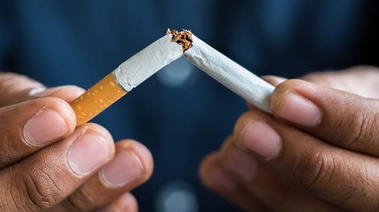Nicotine is the chemical in cigarettes that keeps you coming back for more. When you smoke, nicotine reaches your small airways and alveoli of the lung, where it’s absorbed and enters your blood stream. It reaches your brain in a matter of about 10 to 20 seconds.1 There, it releases neurotransmitters from your brain, including dopamine—a “feel good” compound that can boost your mood and provide feelings of pleasure.2 When you decide to quit smoking, your body has to adjust to a life without nicotine. You’ll likely feel nicotine cravings and may experience symptoms of withdrawal. But when you put your final cigarette down, how long does the nicotine actually stay in your system? Read on to find out.
Nicotine in Your Body
As you puff a cigarette and after you put it down, the nicotine lingers in your body as enzymes work to break it down. Because it enters your bloodstream, nicotine is distributed to organs throughout your body, including your liver, kidneys, spleen, lungs, skeletal muscles and brain tissue. Nicotine can also be found in saliva, gastric juices and even breast milk.1
In your liver, the majority of the nicotine (about 70% to 80%) is metabolized to cotinine, another chemical compound.2 Nicotine also breaks down into other metabolites/chemicals. Both compounds and their metabolites (the substances produced via the metabolism process) are eventually moved through your kidneys, where they are filtered out and exit the body via urine. However, how long this takes—and how long traces of nicotine and cotinine can be detected in the body—depends on how much and how often you smoke.
How Long Does Nicotine Stay in Your System
Because nicotine breaks down into other chemicals in the body, nicotine tests typically look to detect traces of those compounds, like cotinine, to determine if you have been exposed to nicotine. Nicotine exposure can happen through a number of channels beyond simply smoking a cigarette, including:3
- Ingesting secondhand smoke
- Chewing tobacco
- Absorption through the skin when harvesting tobacco or producing tobacco products
- Using e-cigarettes or vapes
- Using nicotine replacement therapy (NRT) such as nicotine patches, gums or lozenges
- Eating foods with naturally occurring nicotine
Nicotine is typically only detectable in your bloodstream for a short amount of time (about one to three days), whereas its metabolites last in the body longer: up to ten days. In fact, after your final exposure to nicotine, about half of it is already broken down by the body within a matter of hours.4 Still, several factors impact exactly how long nicotine and cotinine can be detected in your system.
How long it takes your liver to metabolize nicotine depends on a number of individual characteristics, from genetics factors to your diet and what you ate that day. Other factors include, but are not limited to:1
- Age – nicotine clearance decreases with age
- Sex – studies have found women metabolize nicotine and cotinine faster than men
- Estrogen hormones – there is a strong relationship between high estrogen levels, observed in premenopausal women, and increased metabolism of nicotine
Smoking tobacco itself can also impact how long nicotine stays in your system. Studies have shown nicotine clearance is 14% higher after four days of not smoking and 36% higher after one week of not smoking, compared to just one night of not smoking.1
How Long Can Nicotine or Tobacco Use Be Detected?
Urine, saliva, blood and hair can all be tested to detect nicotine and cotinine.4 Different testing methods can detect whether you’ve had long-term exposure to nicotine products, as well as how much. Cotinine can be found in blood plasma, saliva and urine. It can typically be detected in these three mediums for three to four days after stopping smoking. Because traceable levels of cotinine do not remain in the body for an extended amount of time, testing for cotinine is useful for measuring the amount of nicotine the body is exposed to, but not necessarily for how long.1
Tests to the hair and nails can be used to determine long-term exposure to nicotine and cotinine. This is because these chemicals are incorporated into hair and nails as they grow. Traces of nicotine and cotinine can be detected several months after smoking a cigarette or other exposure to nicotine.1
Tobacco, Nicotine and Your Healt
It’s clear to see that smoking a cigarette is not just “breathe smoke in, breathe smoke out.
"When you smoke, your body absorbs a number of chemicals, including nicotine, and it has to work hard to clear those chemicals out."
While nicotine itself doesn’t stay in your body for long, the chemicals it breaks down to last in your system for days or weeks. The more you use tobacco and other nicotine products, traces of nicotine and its metabolites may be found in your organs long after you stop.
SOURCES:
1.Nicotine Chemistry, Metabolism, Kinetics and Biomarkers. Handb Exp Pharmacol. https://www.ncbi.nlm.nih.gov/pmc/articles/PMC2953858/. Accessed 9/16/21.
2.Nicotine Dependence. Mayo Clinic. https://www.mayoclinic.org/diseases-conditions/nicotine-dependence/symptoms-causes/syc-20351584. Accessed 9/16/21.
3.Nicotine and Metabolites, Random, Urine. Mayo Clinic Laboratories. https://www.mayocliniclabs.com/test-catalog/Clinical+and+Interpretive/82510. Accessed 9/16/21.
4.Nicotine and Cotinine. Lab Tests Online. https://labtestsonline.org/tests/nicotine-and-cotinine. Accessed 9/16/21.






